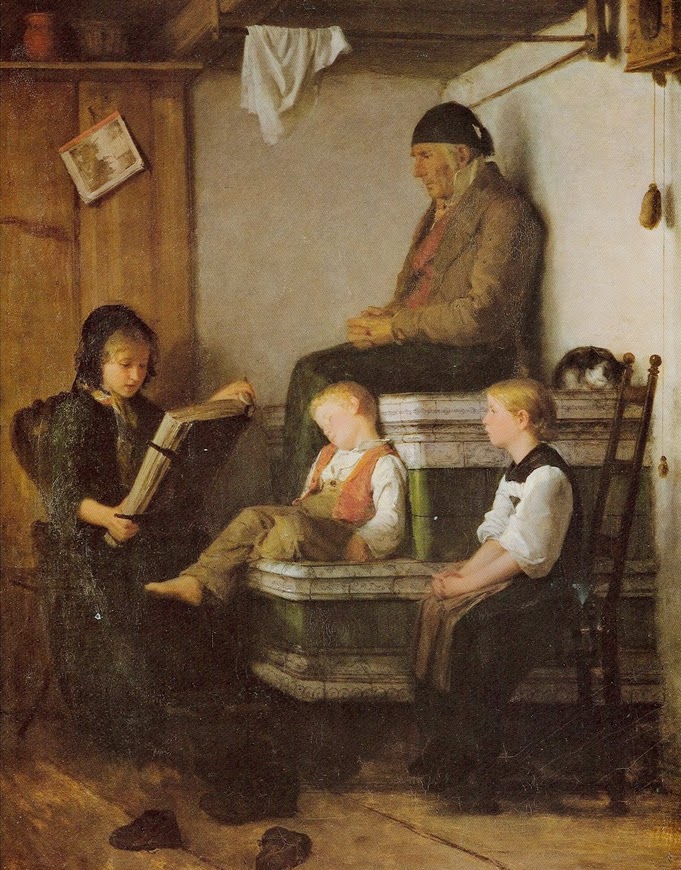Archive, Readings
The Gospels in Greek: Introduction
Reading, for us moderns, is something we do privately, in silence. We settle down with a book, or an electronic device, and shut out the rest of the world as best we can. In Western art and literature, the figure of the reader stands for attention in solitude.
In antiquity, reading was a different matter. Not only were privately owned texts a rarity; few could read. Even in a text-focused culture like post-exilic Judaism, illiteracy was the norm. That did not mean that people were unexposed to the written word. But most depended on others to read it to them. Reading was a communal exercise. Texts were largely accessed through the medium of a reader’s voice.
When I started studying Biblical languages, I asked myself: What did the early proclamation of the Gospel in Greek sound like? The way I was taught did little to provide an answer. Into my hands was put a new edition of Wenham’s venerable Elements of New Testament Greek. It said nothing about pronunciation and had even removed stress accents, allegedly to make things easier for the student. There was no question of reading the Greek out aloud. As a learner I found this approach frustrating and dull. From the point of view of someone who has since taught Greek, I consider it indefensible.

A breakthrough moment, years later, was the discovery of the tape that accompanied CUP’s excellent Reading Greek, a recording now hard to come by, alas. Hearing Professor W. Sidney Allen read from the Odyssey was, to me, electrifying. For the first things I encountered ancient Greek as a living medium of speech, beautiful and full of verve. I went on to read Allen’s Vox Graeca (CUP, 1964). I loved it. It is admittedly a book for specialists — some would say for nerds — but its intention is popular in the deepest sense: it seeks to put contemporary readers in touch with voices of the past in a way that is immediate and auditive, refusing to reduce ancient texts to hieroglyphs. As Allen wrote in a companion volume, Vox Latina:
If, therefore, we are to try to appreciate an author’s full intention, including the phonetic texture of his work, we must put ourselves as nearly as possible in the position of the native speaker and hearer of his day. Otherwise, however full our grammatical and lexical understanding of the work, we shall still be missing an important element of the contemporary experience.
In Vox Graeca, Allen cites the heartfelt lament of an earlier colleague, Claude Lancelot, one of that remarkable group of learned gentlemen who were attached to the Cistercian abbey of Port Royal. In his New Greek Method from 1655, Lancelot wrote: ‘Je ne croy pas qu’il y ait personne qui ne voye quelle misère c’est de ne rien comprendre en cette Langue que par les yeux.’ That is to say: ‘I do not think anyone can fail to see what an impoverishment it is to have no grasp of this language except by means of the eyes.’
This is true in a supreme degree for the sacred text. The evangelion was, at first, read aloud and listened to. Our ears hunger for it still.
The recordings featured here are an attempt to approach the Greek of the New Testament as living speech. I have applied, to the best of my ability (and with evident limitations), the principles of pronunciation established by Allen and scholars sailing in his wake. Naturally, no modern reading will be exactly like the reading of the ancients. We simply don’t have records of what they sounded like. We have, though, a good idea of norms by which they regulated speech. These I have tried to interiorise. My recordings do not claim to be authoritative. They are the lectio divina of an amateur, someone who loves the text he reads, in the hope that his effort will inspire, perhaps even help, others to love and learn it better. Greek is not a ‘dead language’. On the contrary.
I have so far recorded the Gospel of Mark. If time and circumstances permit, I shall add other readings in the months ahead. Some might ask: Doesn’t a bishop have better things to do? I would answer, without a moment’s hesitation: No! The most essential thing a bishop can do is to engage lovingly, intelligently, perseveringly with the Word of God in its most authentic expression so that it may become part of him, a word he not only preaches but, by God’s grace, embodies and carries abroad.
